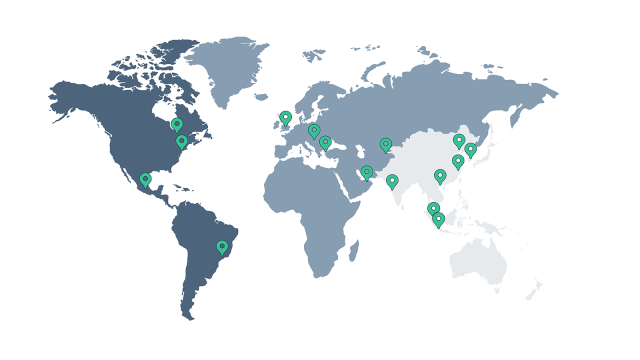From 2021, LBBW will be completely climate-neutral. The bank will achieve this goal by continuing to systematically reduce its CO2 emissions and offsetting all remaining unavoidable emissions. The bank’s strategy here is not to buy emissions certificates, but instead to invest in forestation itself.
Specifically, LBBW is investing USD 3.5 million in the global forestation fund Arbaro Fund. The fund’s resources are used for long-term forestation projects in Latin America and Africa. In addition to the positive effect on the climate, the investments help protect the environment and the social needs of populations near the projects. The UN’s Green Climate Fund (GCF), the central and biggest multilateral international tool for funding environmental protection, also invested in Arbaro Fund together with LBBW.
UN’s Green Climate Fund is also investing
“By going climate-neutral, we have reached another milestone in our commitment to sustainability,” says Thomas Rosenfeld, managing director of LBBW Asset and Wealth Management and chair of the LBBW sustainability board. “Thanks to investing our own capital in a forestation fund as opposed to buying certificates, we are going significantly further than our peers. This underpins our aspiration of being one of the most sustainable universal banks in Europe.”
The Arbaro Fund calculates the amount of carbon stored by its forests based on the guidelines of the Intergovernmental Panel on Climate Change (IPCC). In addition, internationally recognized certification processes such as the VCS and the “Gold Standard” developed by the WWF and other environmental associations are used to calculate the compensatory effect of its projects reliably. The trees planted with the help of LBBW’s investment during the fund’s 15-year term will remove a total of around 350,000 tons of CO2 from the atmosphere. The project will also create 2,000 jobs with fair wages in western Africa alone. Tony Clamp, acting Director of GCF’s Private Sector Facility, said the Arbaro Fund project represents a great example of how the private sector can play a pivotal role in managing forests sustainably in developing countries. “The Arbaro Fund project aims to reduce greenhouse gas emissions by decreasing pressures on natural ecosystems, while empowering local communities by providing employment opportunities,” he said. “We want to turn around the current underutilisation of the private sector in financing forest conservation.”
LBBW active since 1992
Climate protection has a long history at LBBW. As early as 1992, it was one of the first banks to release an environmental report. In 2013, it adopted a climate strategy and in 2019 it was one of the first to sign the voluntary commitment to climate protection in the German financial sector. As part of its climate strategy, LBBW commits to limiting CO2 emissions when using resources in its operations as much as possible, for example by optimizing building technology and IT hardware and opting for regional products and suppliers. This has already reduced the bank’s carbon footprint by around a quarter in the last ten years. Since 2019, a specialist team of dedicated employees has been responsible for continuing to shrink this footprint.
The bank also wants to use its services to promote low-carbon business practices, for example by funding renewable energies. Last year, almost 90% of project financing in the energy sector went towards renewables. With investment in international forestation projects, an additional element will be added from 2021.
Take advantage of the bank’s key role in the economic cycle
In addition to environmental protection, there are numerous other dimensions to LBBW’s commitment to sustainability. Sustainability has been one of the four central pillars of the business strategy since 2017. Since then, the bank has been systematically working on incorporating sustainability into all divisions and business areas. For example, it is steadily expanding its advisory services and product range for both sustainable investments and green financing. It already manages customer funds of around EUR 23bn in line with sustainability criteria. Only recently, a consultancy team was launched that helps companies develop sustainable business models and use suitable financing tools.
LBBW is also increasingly gearing its issuing business towards sustainability and is one of Germany’s forerunners when it comes to green and social bonds, with an outstanding volume of over EUR 5bn. “We understand the challenges faced by the industry and by society as a whole. This is why we want to take advantage of our key role in the economic cycle to gear cash flows towards a sustainable economy and promote this issue to our customers,” summed up Thomas Rosenfeld.



